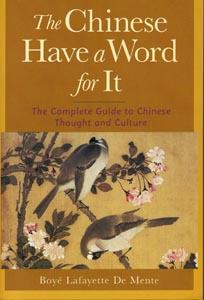The Chinese Have a Word for It
Title: The Chinese Have a Word for It.
Subtitle: The Complete Guide to Chinese Thought and Culture.
Author: Boye Lafayette De Mente.
Publisher: Passport Books (2000)
ISBN: 0-658-01078-6.
Details: paperback, 6" x 9", 506 pages.
* * *
From the back cover:
The Chinese Have a Word for It - but their language is so heavily imbued with cultural significance that it presents an extraordinary challenge for foreigners to understand. Now, by examining the underlying meaning of more than three hundred key words and expressions, this comprehensive guide provides a unique insight into the thought and culture of contemporary China.
Many of these attitudes are derived from the writings of China's greatest philosophers or are based on traditional values that still remain strong, such as xin (sincerity), which encourages blank facial expressions as a means to conceal feelings. Other concepts have been generated during more recent times, such as ganjin (strength, energy). used to describe the new generation of skilled professionals and independent entrepreneurs.
This is an ideal introduction to Chinese history, thought, and culture and also serves as a practical guide, both for appreciating the nuances of what the Chinese mean and for avoiding cultural faux pas. It is the ideal companion for anyone with an interest - personal, business, or travel - in China.
About the Author:
Boye Lafayette De Mente, a renowned sinologist, brings more than twenty-five years of experience in China to this study.
* * *
Excerpt from the book:
#61 - Funu Wenti - "The Woman Problem"
Mao Zedung, of all people, recognized that China would never be able to throw off the shackles of the past, especially the limitations imposed by Confucianism, until it resolved its funu wenti or woman problem.
From the beginning of Chinese civilization until 1950, women in China were generally treated as the property of men, and were used and abused according to male needs and whims. Records of women who escaped this domination are rare - but they do include a few instances of female bandit leaders, warlords and generals.
...
In 1950, the year following the Communist takeover of China, Mao backed the "Marriage Law of 1950," which prohibited arranged marriages, concubinage, foot-binding and child marriages; limited doweries that could be paid for brides, and made divorce easier.
...
Most foreigners who are intimately familiar with China say that Chinese women are stronger willed, often more intelligent, and generally more flexible and ambitious than Chinese men, and that given the smallest opportunity to better their situation they will seize it with extraordinary tenacity.
* * *
* * * * *
 ThingsAsian
ThingsAsian

















